Christian nationalism is gripping the nation — has it arrived in Ottawa County?
OTTAWA COUNTY — Passionate public comment has dominated recent Ottawa County board meetings, as residents react to several sweeping, controversial changes made earlier this month. As they speak, two distinct storylines are taking shape.
More:Ottawa County remains a community divided in most recent board meeting
More:Did the majority of Ottawa County support Ottawa Impact at the polls? The data says no
Supporters of the board — now led by eight members of far-right political group Ottawa Impact — have frequently brought up COVID-19-based talking points, claiming the 2020 presidential election was "stolen" or challenging the effectiveness of face masks and vaccines.
What’s emerging as a more powerful message, however, is the "divine plan" many of the board’s supporters say was responsible for the August primary election that secured the officials’ victories.
”The power you have has been delegated by Christ."
“You were chosen for this."
"The Lord says he will bless all who serve him and the enemies will lie beneath his feet."
But opponents have a different take.
“This is Christian nationalism, where religion supersedes the state.”
Although many opponents have focused on specific policy decisions made by the board, some speaking during public comment have also been disturbed by the religious rhetoric Ottawa Impact has touted — and the increasing presence of faith-based commentary at government meetings.
"I am a born-again Christian,” one man told the board Tuesday, Jan. 24. “Perhaps those in this room will listen to me: I do not believe we should force our views on the public."
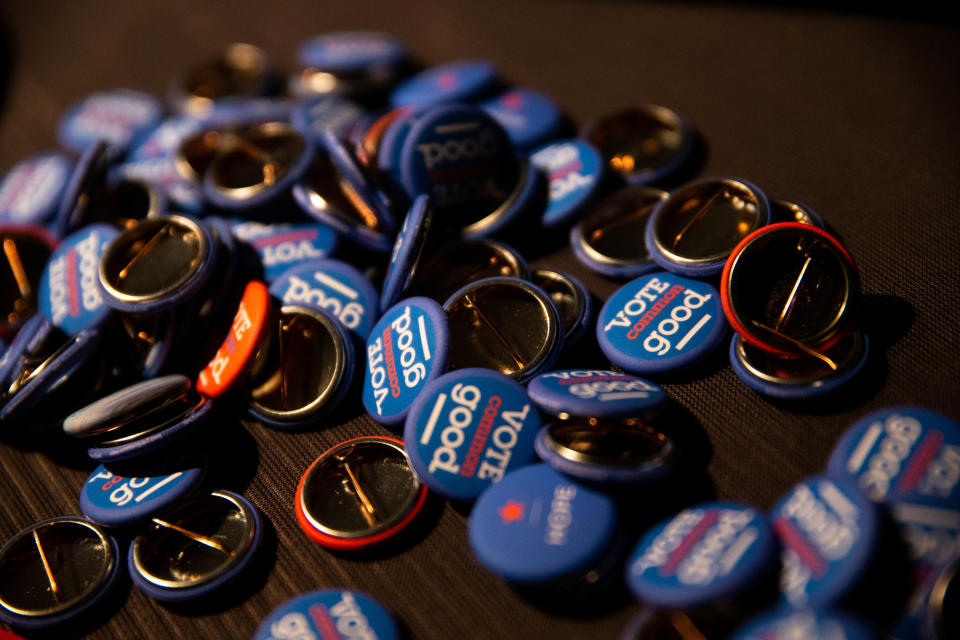
What is Christian nationalism?
Loosely defined, Christian nationalism is the development of politics and culture that reflect America as a Christian nation.
“It’s the idea that the United States was founded as a Christian nation and should be defended as such,” said Kristin Kobes Du Mez, an American historian, author and professor of history and gender studies at Calvin University. “It’s a modern manifestation of this mythical idea that God has a special plan for America — if it responds obediently.”

According to John D. Wilsey, an associate professor of church history at Southern Baptist Theological Seminary in Louisville, Kentucky, the concept of Christian nationalism has seen several manifestations throughout U.S. history, but modern-day nationalists share three common themes:
They believe the American founders were Christians
Theologically, they believe God has uniquely blessed America
Philosophically, they believe they can interpret the intent of the founders much as one would interpret scripture
There are cases where Christian nationalism has been viewed, historically, as positive. Abraham Lincoln, for example, suffused his speeches with biblical language in support of preserving the Union. He interpreted the Civil War not as God’s vindication of the north over the south, but as God’s judgment on the nation as a whole for the sin of slavery.
Wilsey said this was an example of "good and righteous" Christian nationalism, "manifesting hope and flourishing through human freedom and equality under God.”
Wilsey, who writes extensively about Christian nationalism in his essay, “The Many Faces of Christian Nationalism,” said that, while some earlier conceptions of Christian nationalism were forward-looking, its modern iteration is more nostalgic, looking back to an imagined past and cherry-picking facts from history.
Du Mez said the avoidance of a full accounting of American history and a fixation by staunch conservative groups to target concepts such as Critical Race Theory in schools is actually part of a strategy to ensure their own political power.
On @standupwithpete tomorrow the brilliant author and professor @kkdumez gives the BEST 2 min explanation of what white evangelical conservatives and governors like #DeSantis believe and why they are doing all they can to prevent young people from learning accurate history. pic.twitter.com/I82DNqeixR
— Pete Dominick (@PeteDominick) January 25, 2023
“Christian nationalism has this myth that America is a good country, from its founding,” Du Mez told Pete Dominick this week on his “Stand Up with Pete Dominick” podcast. “And so when you get something like the 1619 Project that says, ‘Well, wait a minute here. Explain how a 'Christian' nation can decimate Native Americans, can enslave Black populations or African populations — explain again how that’s Christian?’
“That strikes at the heart of that primary identity that we are God’s chosen people and that this is our country,” du Mez said. “And so education disrupts that. History disrupts that — just plain old history. You don’t need CRT — nothing against CRT — but you don’t need it. All you have to do is read basic American history and it will mess with any myth of Christian America.”
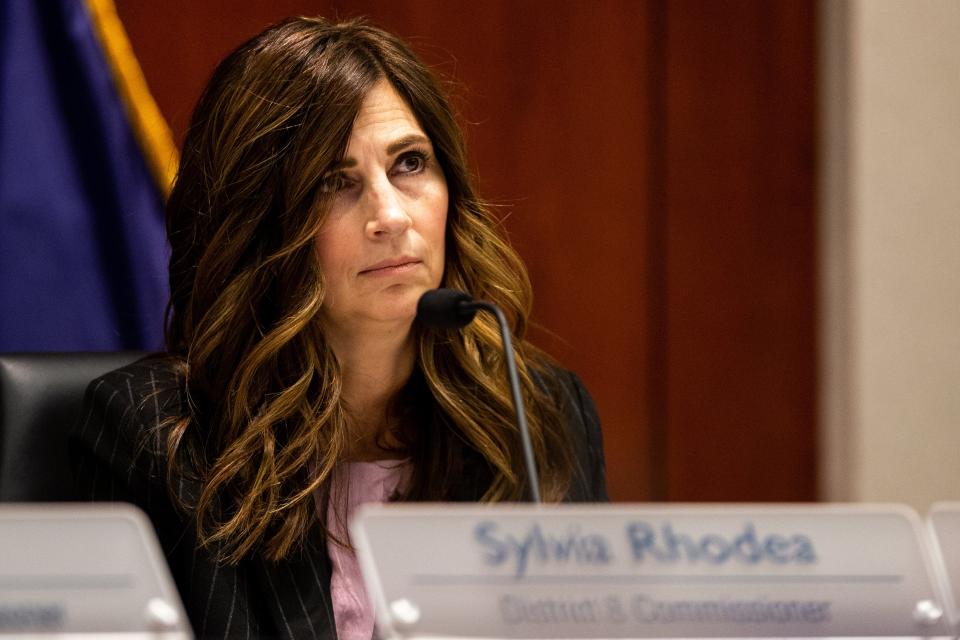
Ottawa Impact's Christian-driven platform
Ottawa Impact is an upstart far-right political group borne from clashes over the county’s COVID-19 mitigation mandates in 2020. Its founders, Joe Moss and Sylvia Rhodea, targeted the Ottawa County Commission seats in 2022, recruiting like-minded candidates who agreed “traditional Republicans” weren’t enforcing true conservative policies.
More:Ottawa County remains a community divided in most recent board meeting
More:Ottawa Impact campaigned on transparency. In their first meeting, they blindsided the community.
All of its candidates were required to sign a contract saying, “We recognize our nation’s Judeo-Christian heritage and celebrate America as an exceptional nation blessed by God. We stand united to restore and amplify the principles of American exceptionalism.”
Those who signed the contract received funding and campaign support from Moss’ PAC — Ottawa Impact PAC — while agreeing to some specific policy changes upon entering office, including:
Opposing what it calls “unconstitutional orders” by the government in times of crisis, including mask and vaccine mandates
Disavowing any and all promotion of "divisive" racial equity, privilege and implicit bias training
Opposing the use of Planned Parenthood resources
Ottawa Impact candidates unseated eight Republican incumbents on the county board during the August primary. Most went unchallenged in November.
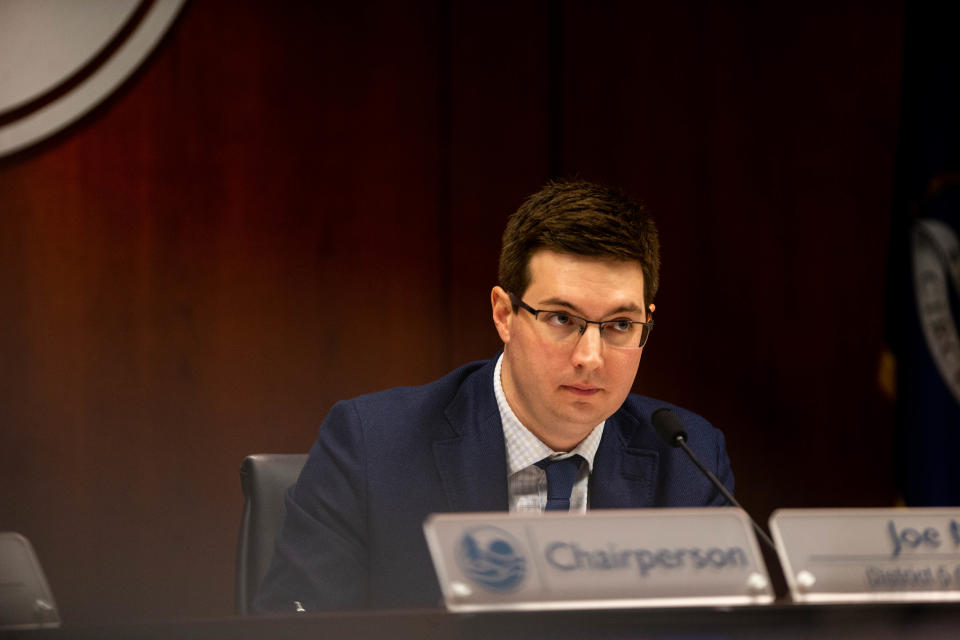
During its first board meeting Jan. 3, Ottawa Impact wasted no time, systematically adding several unannounced items to the agenda and approving them, including firing the county’s administrator, selecting a different health officer than the previous board picked in December and firing its longtime legal counsel in favor of a conservative law group best known for challenging government mandates during the pandemic.
The board also changed the motto of the county from “Where You Belong” to “Where Freedom Rings.”
“Christian nationalists want to define America as a Christian nation and they want the government to promote a specific cultural template as the official culture of the country,” writes Paul D. Miller in Christianity Today.
“Some have advocated for an amendment to the Constitution to recognize America’s Christian heritage, others to reinstitute prayer in public schools. Some work to enshrine a Christian nationalist interpretation of American history in school curricula, including that America has a special relationship with God or has been ‘chosen’ by him to carry out a special mission on earth.”

The role of the pandemic
The COVID-19 pandemic was a galvanizing worldwide event in a myriad of ways. As many communities struggled to keep close contact with family and friends while navigating state and county mitigation efforts, several churches saw a renaissance in West Michigan, especially those with large facilities and land that could host outdoor services.
While some looked for ways to reconnect with others, others harbored resentment to the disruption of their lives.
Bart Spencer, senior pastor of Lighthouse Baptist Church, made headlines early in the pandemic when he encouraged his congregation to contract the virus to “get it over with,” which was met with heavy criticism from local health professionals.
His church held in-person services throughout the pandemic. Some congregants wore masks and practiced social distancing — others didn’t.
“We trust our people to make their own decisions,” Spencer told The Sentinel in March 2020. “We respect one another’s positions.”
As states grappled with their approach to COVID-19 mitigation strategies — states with Democrat governors primarily opted for stricter lockdowns and social-distancing requirements, while states run by Republicans mostly avoided such measures — the politicization of COVID, its origins and how to avoid and treat it began trickling down from the national level and polarizing communities.
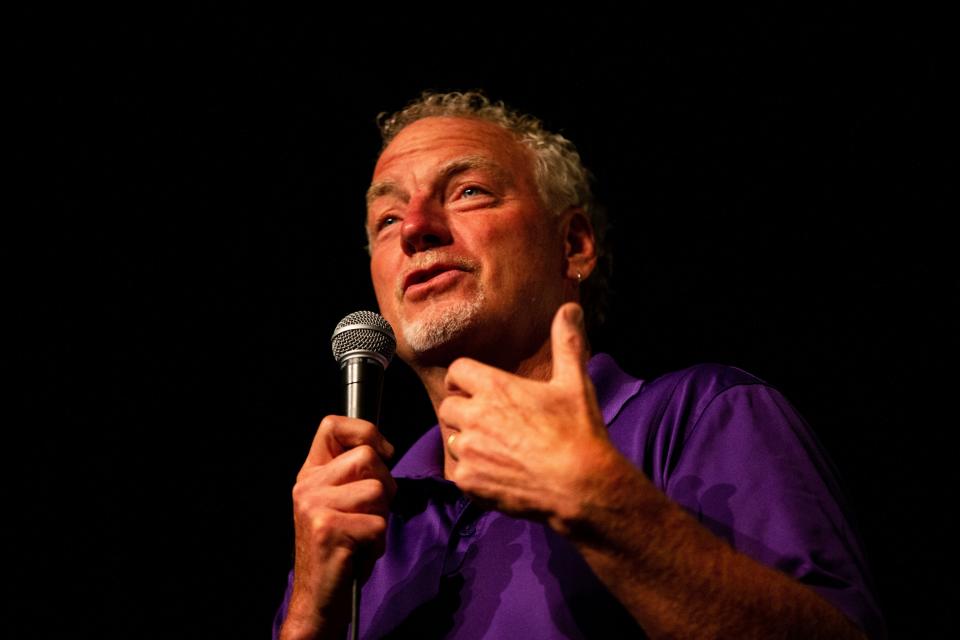
One Holland-area pastor told The Sentinel in October 2020 that politics infiltrating religion was so toxic, he walked away from the Christian Reformed Church after 30 years as a pastor.
Keith Mannes said he loved his congregation at East Saugatuck CRC, where he'd been for the previous four years, but said the church as a whole had “abandoned its role” as the conscience of the state in support of then-President Donald Trump.
“There’s a quote from Martin Luther King where he said, ‘The church must be reminded that it is not the master or the servant of the state, but rather the conscience of the state,’” Mannes told The Sentinel. “That just hit me hard because I think, broadly, the white evangelical community in our country has abandoned that role."
More:Holland CRC pastor leaves church amid political tensions
More:Holland pastor: Get COVID-19 and 'get it over with'
George Lundskow, a sociology professor at Grand Valley State University who studies the sociology of religion, said support from the religious community is tied to how people view God.
Lundskow said, while some of the former president’s actions may not align with Christian values, Trump aligned himself with conservative Christians by acting similar to how they see God — judgmental and punitive.
“(His actions) don’t seem very Christian, much less conservative Christian,” Lundskow said. “I don’t think it’s about that. It’s something else about religion — whether you see God as punitive and judgmental or the loving, forgiving version of God. That definitely shapes political views as well.”
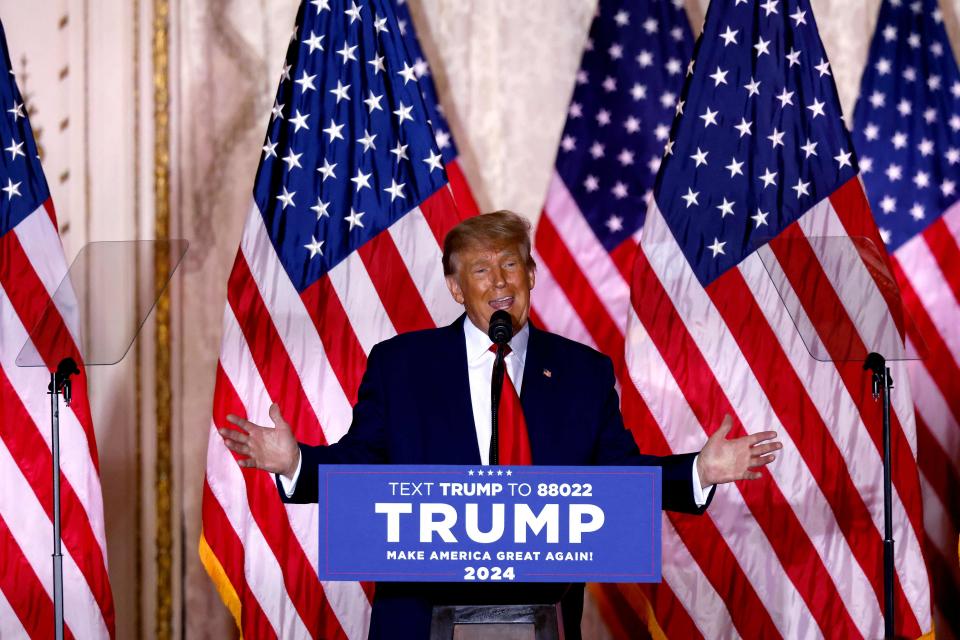
That's reflected in how Ottawa Impact's backers are framing their support of the board.
"Though the world laughs, please keep serving God," said one woman Tuesday, saying, “They all laughed at Noah when he warned everyone about the flood."
"We should all abide by the Ten Commandments so that those of us who repent won't burn in hell,” said another supporter. “I think we have this much dissension because God's message has been watered down."
"Clearly, these communists have no interests for these Christians to be represented,” said another. “The communists demand you be accountable to the voters, but the power you have has been delegated by Christ."
Lighthouse Baptist Church hosted nearly all of Ottawa Impact's candidate forums on the campaign trail — they declined all local media interview requests and refused to participate in traditional nonpartisan events hosted by groups such as the League of Women Voters.
Spencer was invited to lead a prayer at the beginning of one county board meeting.
"'We wrestle not against flesh and blood, but against principalities, against powers, against the rulers of the darkness of this world, against spiritual wickedness in high places,'" Spencer said Jan. 10 during the prayer. "Ottawa County has been the signal county — we may be a bit biased, Father — but the signal county of this state. Lord, she has been a great county for decades and decades and decades.
"And Lord, there’s been threats. And Father we will stand for thee," Spencer continued. "Father, you even told us when you stand, the world’s not going to like that. They’ll hate you, they’ll persecute you, they'll ostracize you. ... I pray for the chair and that you would bless him and the other council members, commission members. Again, knowing the only reason we’re here is to bring glory to you."
Meanwhile, Mannes struggles to find meaning in what he called a "crisis in the faith" during the Trump era.
At the time he left his congregation, Mannes said he understood how some Christians continued to support politicians like Trump and Florida Gov. Ron DeSantis, but implored people to think about what it means to be a Christian.
“I would just implore anybody who claims Christ to just look very seriously at the core things Jesus called us to do and be,” Mannes said. “Do some serious soul searching about who you’re serving and how you’re trying to accomplish that purpose in the world.”
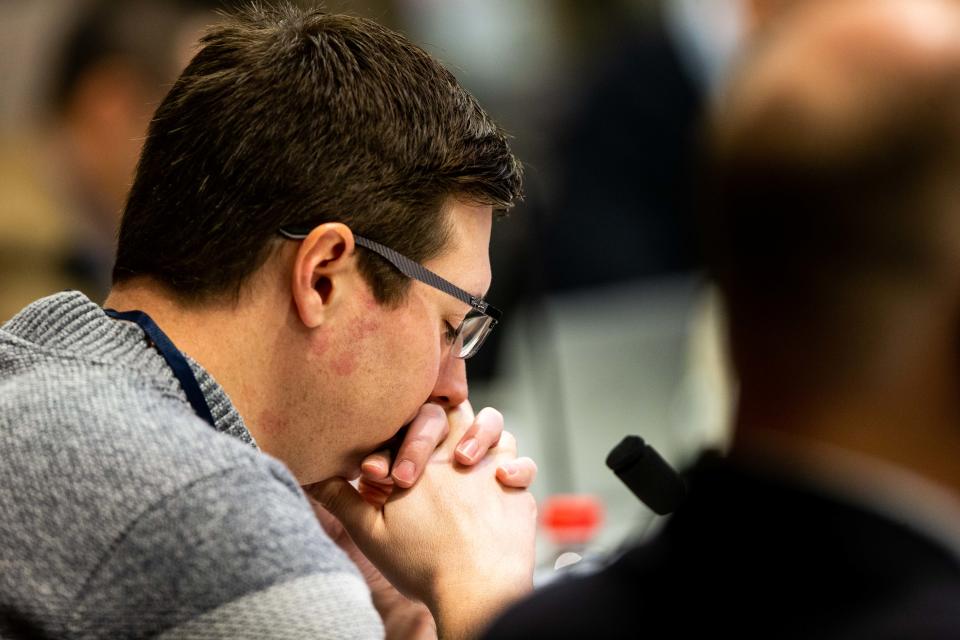
Are the board's goals realistic?
Despite its laundry list of accomplishments at its first meeting, the Ottawa Impact-led board might see roadblocks to some of its goals.
The Michigan Attorney General's Office announced Jan. 4 it would investigate the county board's first meeting and evaluate if the group violated the state's Open Meetings Act.
Although the AG’s office didn't outright accuse commissioners of violating OMA, the newly elected officials clearly met and communicated prior to being sworn into office to plan the decisions made in that meeting, which was later confirmed in text messages obtained through a Freedom of Information Act request.
More:Michigan AG reviewing shakeup in Ottawa County, possible Open Meetings Act violations
More:Newly obtained texts show Ottawa Impact officials orchestrated law firm change before taking office
If OMA violations are found, it’s possible all the decisions made during that meeting could be nullified, which could prove to be a logistical catastrophe.
The appointment of Nathanial Kelly to be the county’s health officer could also prove problematic, because the former board already offered the position to internal candidate Adeline Hambley in December. The state health department must approve county health officers — an approval Hambley already secured Dec. 20.
It's unclear if the state health department can review Kelly's eligibility; the board didn't fire Hambley, but named her the "interim" health officer at the Jan. 3 meeting until Kelly received state approval. Because Hambley currently occupies the position, there technically isn't a vacancy within the county for the state to review.
More:Ottawa County board picks internal candidate as new health officer
More:Residents angered over Ottawa Impact policies form coalition to vote them out in 2024
If the board finds impediments that are insurmountable — such as its authority to fire the county health officer — the OI commissioners will likely find a way to explain to their supporters that it’s not their fault, said Whitt Kilburn, a professor of political science at Grand Valley State University.
“They will blame everyone else for their failure a la Trump,” Kilburn said. “That the system is conspiring against them — the deep state. It very much reads to me like the death throes of a movement that is waning.”
That’s a huge concern, said du Mez, as the likelihood of politically fueled violence continues to rise in the wake of a foiled plot to kidnap Gov. Gretchen Whitmer in fall 2020 and the post presidential election insurrection at the Capitol in Washington on Jan. 6, 2021.

“There’s such a rhetoric of embattlement,” du Mez said. “There’s this idea that we’re restoring something that was lost and that to secure God’s blessing, you need 'real' Americans in charge — people who adhere to Christian nationalism have a lot of views that correlate to that.”
“The antidemocratic nature of militant Christian nationalism was on full display on Jan. 6, 2021,” du Mez wrote in the Spanish newspaper el Pais.
More:Michigan a political breeding ground for extremism
“On the day insurrectionists stormed the U.S. Capitol in an effort to overturn the presidential election, participants marched with crosses and carried signs that read ‘Jesus Saves, Trump Leads’ and ‘Jesus is King, Trump is President’ and a group of Proud Boys knelt in prayer."
Although insurrectionists might qualify as extremists, recent surveys reveal that more than a quarter (26 percent) of white evangelical Protestants believe “true American patriots might have to resort to violence in order to save our country,” du Mez said.
“The warrior ideal has profoundly shaped American evangelicalism, but its influence is not limited to the United States,” she said.
Josh Pasek, professor of media, communication and political science at the University of Michigan, says the phenomenon known as “affective polarization,” where opposing sides increase their dislike for each other, has led to a much higher propensity for violence.
“We're in a political era right now where things are highly contentious,” Pasek told The Sentinel in October 2020. “Now, coupled with the affordances of social media — the thing that social media likes to do — creates an environment where people are very much able to find others like them who hold similar beliefs, and to think that those people on the other side are behaving maliciously. And that leads to radicalization.”
And white evangelicals are significantly more likely to exhibit authoritarian tendencies than other religious groups in America, du Mez said.
“They deny that voter suppression is a problem, and believe that the 2020 election was stolen from Trump,” she said.
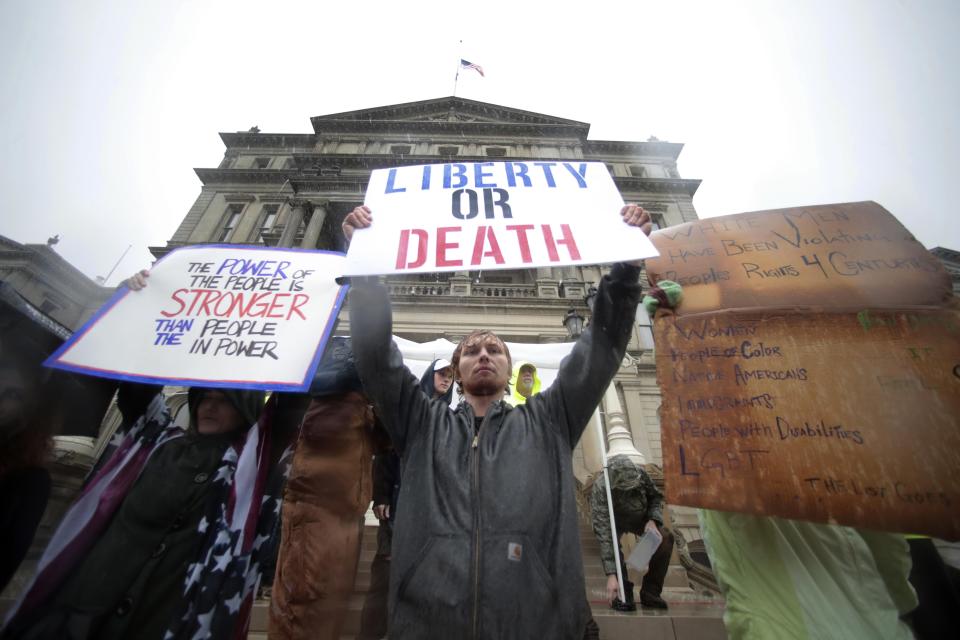
That's left many Ottawa County residents nervous for what’s to come in the two years under Ottawa Impact’s leadership.
"Fascism is the state hurting others,” Don Bergman told the board Tuesday. “It leads to slavery and the gas chambers."
Subscribe:Receive unlimited digital access to your local news coverage
Bergman said one of the tell-tale signs of fascism — a system of government led by a dictator who typically rules by forcefully and often violently suppressing opposition and criticism — is denying minorities equal civil rights.
"Trump is the fascist of America,” Bergman told the board, to cheers and boos. “DeSantis is the fascist face of America. (Bill) Huizenga, House Republicans, the Jamestown book burners — right now, I'm looking at the fascist face of America."
— Sarah Leach is editor of The Holland Sentinel. Contact her at sarah.leach@hollandsentinel.com. Follow her on Twitter @SentinelLeach.
This article originally appeared on The Holland Sentinel: Christian nationalism is gripping the nation — has it arrived in Ottawa County?

